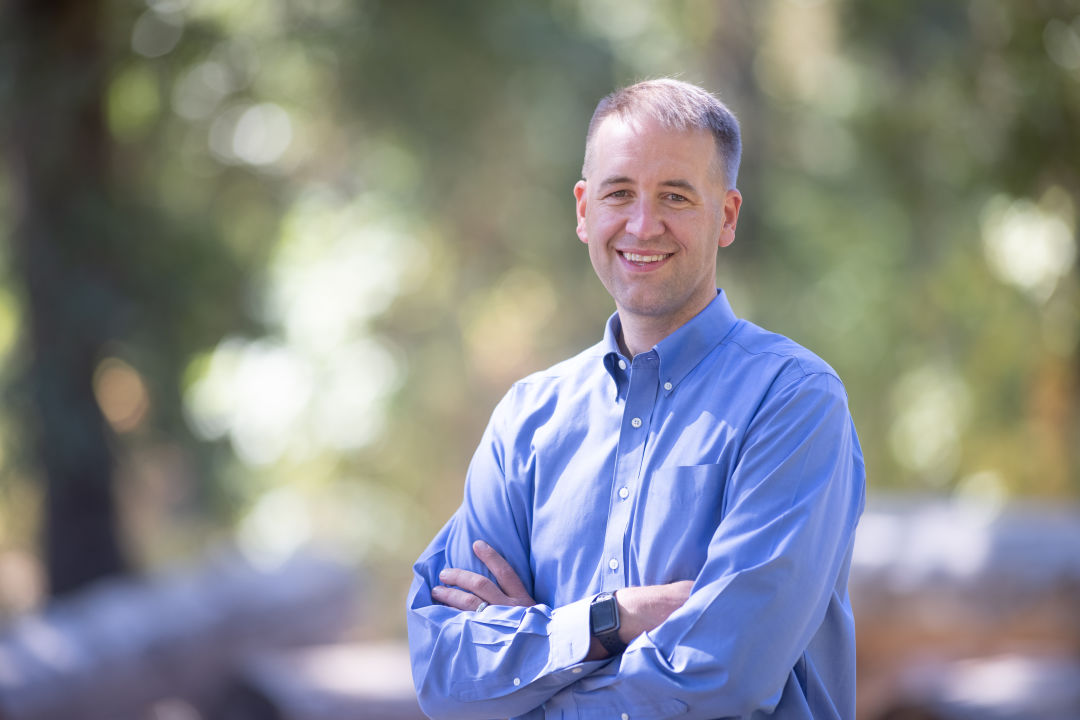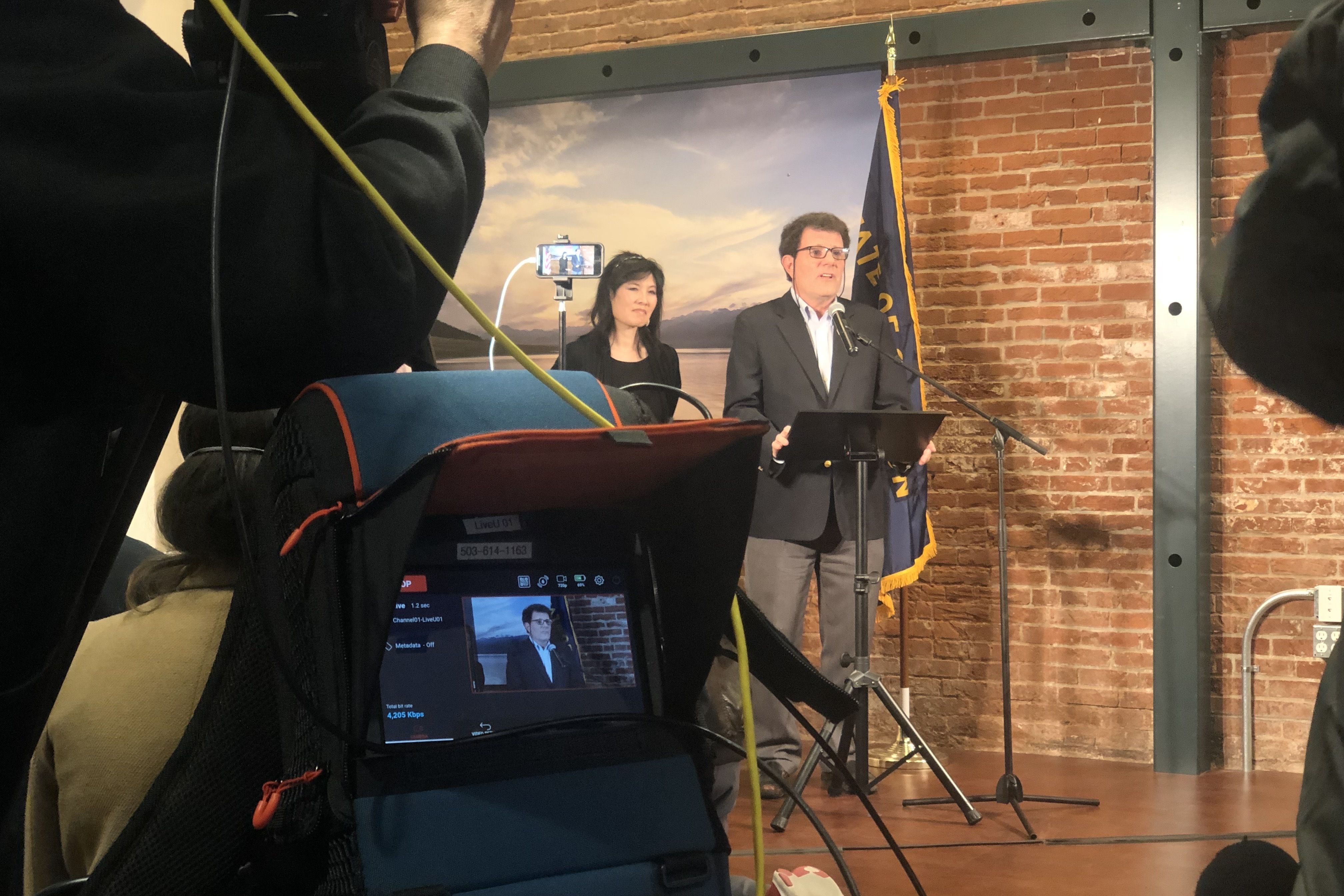Tobias Read Has Two More Months to Make His Case to Democratic Voters

Oregon State Treasurer Tobias Read is running for the Democratic gubernatorial nomination in Oregon.
Two months and counting until the May primaries in Oregon and the field is now set for the Oregon governor’s race, the first time in 20 years that the seat won’t be occupied by an incumbent or former governor.
Tuesday was the deadline to file for entry into the race, and it passed without any last-minute surprises. (Whither the candidacy of outgoing Multnomah County Chair Deborah Kafoury?) With former New York Times columnist Nicholas Kristof’s early exit, that sets up a Democratic primary between two major contenders: former Oregon House Speaker Tina Kotek and current state Treasurer Tobias Reed. (There are 15 other Democratic contenders, none of whom have yet raised significant money or garnered major endorsements.) And though Democrats have held nearly every statewide office in the state for the past two decades, sitting Gov. Kate Brown’s approval ratings are among the lowest in the country, suggesting a restlessness with the state’s current course.
Read, a former Nike employee whose wife still works at the footwear giant, spent 10 years in the state legislature before becoming the treasurer, charged with overseeing Oregon’s investment portfolio. (Before moving to Oregon, the Montana native worked in DC as an aide to Lawrence Summers at the US Treasury Department under President Clinton). After a previous conversation with Kotek, we talked with Read about the race, surviving distance learning with his kids, now 8 and 12 kids, who attend public school in Beaverton, and the podcast he recommends for the I-5 commute from there to Salem. (It’s The Bakari Sellers Podcast, with interviews and commentary anchored by the former South Carolina legislator–turned–CNN analyst who got his start in politics at around the same time as Read, who listens at 1.5 speed for maximum efficiency.)
Portland Monthly: I promise, we’ll get to policy, but I’d like to start off by asking for your take on the state of the race now that the dust has settled since Nick Kristof’s exit.
Read: It is a two-person race. And there's one person in the race who has served in executive office who has been elected statewide, twice. What I've learned is that it is not enough just to pass legislation or to appropriate money. The difference is in execution and in the follow-up and making sure that results are delivered to Oregonians. We seem to be long on good intention in Oregon, and short on follow-through and execution. And I think people are not happy with the status quo.
Portland Monthly: Did that perceived dissatisfaction with the status quo motivate you to run?
Read: I've always been motivated by a desire to think about the long run, by making decisions now that will pay off for people in the future. It takes the most direct form, I think, when we look at kids in the pandemic, and how they were not getting the educational experience they needed, and how that translated to nearly everything else. I can see it in my own household, and we had some advantages that not everyone has. And it was hard.
Portland Monthly: We saw that fallout from school closures during the pandemic played a role in recent gubernatorial elections in Virginia and New Jersey. Do you think Oregon will see a similar dynamic, or will enough time have passed for that to recede?
Read: I think it's hard not to put that at the center of the experience for everyone. Parents couldn't work. Employers couldn't find employees. A lot of people didn't think about the people who had to make the decision about whether to care for their kid or keep their paycheck. This is a huge issue and exposed all kinds of things that were not working well beforehand. I talk to educators and other parents now who are dealing with all the forms of mental health challenges that are manifesting themselves. And then there's the less quantifiable things. I will probably never forget the first several days that our kids were able to come back to school. We had to have our kids take turns (at dinner), because they were so excited to talk. There were huge smiles. Their whole outlook and attitude was different by being in school. And I know that's not unique to our house. And also, I don't like the idea that we should just restore things to the way they were. Let's not let that be the height of our ambition.
Portland Monthly: The city of Portland, too, is very different now than it was prepandemic. Do you think that will be an issue in a statewide governor’s race, and in what ways?
Read: If you want to be really tactical and immediate about it, we are a state that is uniquely dependent on the income tax to fund the budget. But it’s broader than that. We've all got a stake in what's happening here. And that is evident when I talk to people around the state. They of course are talking about the communities where they live, but almost invariably, they are also talking about how they feel about what's going on in Portland. People are saying, “We used to go up there to shop or to visit. But I don't want to go there. I don't feel safe.” It is definitely impacted by the situation around houselessness, and around our alarming gun violence numbers.
Portland Monthly: What do you think of the ability of current state leadership to work with city and county leaders? Are they working together the way they need to be?
Read: Not as well as we could be. So often, we have the will, but we may not have the wallet. But it’s almost the reverse at this point. We have dollars, but we can't get on the same page about how to most effectively use them. What bothers me most directly is the binary frame that people set up. There's some people who seem to say, you know, we can't possibly ask people to move from the sidewalks or wherever else until and unless they have a permanent place to go. There are others who think they just need to be removed from sidewalks without a permanent solution. I don't think either one of those is right. We've got to get faster at building permanent housing. But we cannot continue to see our neighbors living in dangerous conditions. That's not fair to them to be surrounded by trash and human waste. It's certainly not fair to people who were trying to operate their businesses and who are feeling unsafe. There's no compassion in that for anyone. The same thing applies to the gun violence question. We have to get a lot more aggressive about enforcement, making sure that that we're banning untraceable firearms. I think we need more officers on the street who have that specific training around how to go after those guns, and the people who are illegally dealing them.
Portland Monthly: Moving forward with COVID-19, it sounds like the metrics that will matter the most are hospital capacity. Given that, do you think we need to increase the number of hospital beds statewide?
Read: It’s a good discussion to have because this pandemic has revealed that vulnerability. But we've got to have staff capacity and staff resilience. And there are a lot of reasons to be concerned about how we are recruiting and retaining [health care workers].
Portland Monthly: Speaking of retaining and recruiting, you’ve been critical of Intel’s decision to expand in Ohio instead of in Oregon.
Read: I feel like the governor and the CEO of the largest private employer in the state ought to be on a first-name basis. That doesn't mean that, you know, we're going to get everything we want, or that they're going to get everything they want. But I think we should be on offense on those things, putting our best foot forward, making sure that we have the best understanding of industrial land availability and plans for infrastructure when there are opportunities in front of us.
Portland Monthly: Let’s wrap up with a question about debates. You’ve proposed four before the primary in May. Any response yet from former House Speaker Kotek?
Read: We have an acceptance to the proposal for a debate on KATU. I don’t think we have any others. I think we should do one in Southern Oregon, one in Eastern Oregon, and I’ll admit a bias—I’m a graduate of Willamette University, across from the Capitol in Salem. So that might be a nice place for a debate, too.




